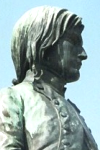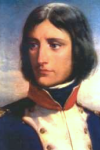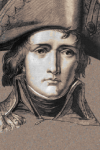Napoleon was born on August 15th, 1769 in Ajaccio , Corsica, the younger son of Carlo Bonaparte, a lawyer of the Supreme Council of Corsica, and Letizia Ramolino. He was baptized in the cathedral of the city on July 21st, 1771, the year the Bonaparte family was given its noble status by the Board of Corsica.

The young Napoleon made his first trip to France in December 1778. He was admitted the following January 1st to the college of Autun, Burgundy, where his father had registered him after having obtained a scholarship. In May 1779, Napoleon joined the military school of Brienne , which prepared children of the nobility for a military career. He demonstrated a remarkable aptitude for mathematics.
He left this institution in October 1784 to enter the Royal Military School of Champ-de-Mars in Paris in the Company of gentlemen cadets.
The year 1785 was a sad one for Napoleon, as he mourned the death of his father Charles, probably of stomach cancer, leaving a widow with eight children and little income. In the fall, Napoleon received his wings of second Lieutenant and was assigned to the artillery regiment of La Fere, stationed at Valence, Rhone Valley.
In 1786, his first leave saw him off to Corsica, which he had left nearly eight years ago. He returned to Paris the following year.
In June 1788, Lieutenant Bonaparte rejoined his regiment, stationed at Auxonne, a small town in Burgundy. In 1789, troubled year, he was responsible for suppressing riots in the region, and then returned to Corsica, where he participated in the political turmoil that was stiring the island. He demonstrated at the time an insular nationalism, supporting the action of Pasquale Paoli, with whom he had an inconclusive interview in July 1790.

Back in Auxonne, Napoleon was promoted to first Lieutenant in June 1791 and transferred to the 4th Artillery Regiment in Valence. On the occasion of a new leave, he joined a battalion of National Guard of Ajaccio, with which he took part in the clashes, which forced him to return to Paris in May 1792 to defend himself. He was reinstated in the army in July 1792 with the rank of Captain and sent to Ajaccio.
His break with Pasquale Paoli, whose supporters had ransacked Bonaparte's house, forced him to flee the island with his family in June 1793. While his family was moving towards Toulon, he joined his regiment in Nice. After a mission in Avignon, he was appointed by the National Convention in command of artillery in Toulon, Provence, with the rank of Battalion chief. Under the command of General Jacques Dugommier, Napoleon took a decisive part in the expulsion of the English fleet with his talent as a gunner. He fought alongside future marshals and generals of the Empire, as Auguste Viesse de Marmont, Jean-Andoche Junot, André Masséna, Louis-Gabriel Suchet and Claude-Victor Perrin. He was rewarded for his great deeds with the rank of Brigadier general.

As Napoleon Bonaparte had commanded from March 1794 the artillery of the army of Italy and had just drafted the campaign plan, the fall of Maximilien Robespierre on July 27th (9 Thermidor) earned him a short imprisonment and suspension from office.
In spring 1795, in Marseille, Napoleon became engaged to Desiree Clary, daughter of a wealthy silk manufacturer. This was one of the few occasions when Joseph Bonaparte, himself married to the older sister of Desiree, showed the way for his younger brother. Later that year, Napoleon refused to be appointed as General of infantry in the Army of the West, joined for a few weeks the topographical bureau of the Committee of Public Safety, offered to go to Turkey to organize the army... before his name was removed from the list of eligible generals.
In October 1795, Paul Barras, General in chief of the Army of the Interior, assigned him the command of forces entrusted with the suppression of the royalists section insurrection in Paris. On 13 Vendemiaire, with the assistance of Guillaume Brune and Joachim Murat, Napoleon Bonaparte defeated about 25,000 royalist insurgents near the Church of Saint-Roch . This earned him, in addition to the nickname "General Vendemiaire", the rank of Major general and Commander in chief of the Army of the Interior.